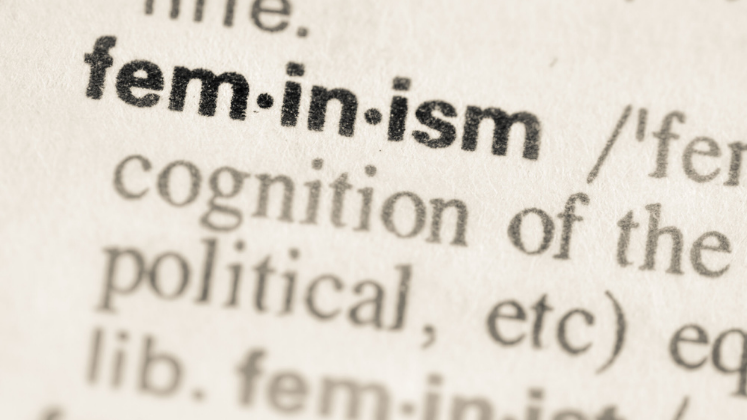In this post, written for International Womens Day (IWD) 2021, Natalia Voutova (Executive MSc Behavioural Science, class of 2019) explores how art combined with behavioural science could trigger behavioural change in the fight against discrimination.
The emotional, sexual, and psychological stereotyping of females begins when the doctor says, ‘It’s a girl.’
US Congresswoman Shirley Chisholm
In 2019 I conducted a feasibility study on how applied theatre could be utilised as a behavioural science intervention to fight discrimination, by reducing the intensity of the biases of individuals (debiasing). This project was part of obtaining my Executive MSc degree in Behavioural Science. My aim was to test if first, post-Soviet women were more accepting of discrimination as part of already established social norms, and second, if with a behavioural intervention, the propensity of women to discrimination, including against themselves, could be reduced.
I conducted a randomised control trial with 294 female university students in Armenia; a framed field experiment to test whether art (applied theatre) and a behavioural intervention (receiving a letter from a psychologist or writing a letter to one’s future self) would affect the level of self-reported acceptance of discrimination or remain the same.
The experiment
The participants were divided into three groups: a control group; treatment group 1 where participants received a letter from a psychologist; and treatment group 2 in which the participants were asked to write a letter to their future self.
Each participant was asked to fill out a questionnaire relating to hypothetical situations related to discrimination. Then they watched a play called The Return which featured some of the social problems and discrimination that individuals with disabilities face. Then they were asked to complete the questionnaire again. Control group 1 received a letter from a psychologist interpreting some of the aspects of the play and filled out the same questionnaire. Control group 2 was asked to write a letter to their future selves and filled out the questionnaire.

The results showed that writing a letter to one’s future self (control group 2) had a statistically significant effect on levels of acceptance of interpersonal discrimination. This effect was even higher for students whose permanent address was in a rural area.
One explanation is that writing to one’s future self is a form of personal catharsis triggered by the emotionally charged exposure to the play thus interiorising the messages embedded in the play and amplifying them. Writing a letter to one’s future self is a more intimate experience than receiving one, even from a trusted messenger. It is hypothesised that in the process of writing of a letter to one’s future self, the Ego effect is also present as individuals act in a way to confirm their image about themselves as positive and consistent (Dolan et al., 2012). The process of writing a letter to one’s future self is meant to reinforce this confidence of being a “good person”. And a good person does not discriminate.
Other than looking at the impact of applied theatre in behaviour change, the experiment revealed three main “conventional wisdoms” that were not universally applicable:
Conventional wisdom N°1: The findings of behavioural science studies are universal.
Behavioural scientists consider their findings about human psychology and behaviour from samples drawn completely from WEIRD (Western, Educated, Industrialised, Rich, Democratic) societies as universal, although their demographics constitutes roughly 12% of the world population (Heinrich, Heine, & Norenzayan, 2010).
The Armenian society is a non-WEIRD one. It is a collectivistic society, where social roles assigned to individuals (father/mother, spouse, daughter/son, brother/sister etc.) are strong and within non-WEIRD social order are the keystone of the individuals’ moral system (Heinrich et al., 2010).
Conventional wisdom N°2: Women are not the largest group discriminated against in different societies.
Women are subjected to diverse forms of discrimination across many states – worldwide 80% of the victims of homicide by intimate partner are women, 13% of police officers are women, 28 % of high managerial positions are held by women and 18% of CEOs, 30% of researchers are women (The World’s Women 2020).
As a former Soviet Republic, Armenia is still much influenced by pre-Soviet and Soviet constructs including that of family, community, and social life (Ishkanian, 2003), where sexism is widespread.
Common wisdom N°3: Art is not a useful tool to fight discrimination.
Applied theatre constitutes a reflection tool on power structure and possible social changes (Tidey, 2019). The effect of drama on the public is multifaceted as it activates emotional engagement through the exposure of characters in whom the public can recognise themselves (Kincaid, 2002).
This experiment, albeit limited in scope, aimed at creating a model that could be used by policy makers to utilise applied theatre as a tool for debiasing individuals not only in the context of gender discrimination but also in other forms of social and cultural biases. The experiment I conducted will be further replicated with other forms of art (for example story telling) to prepare the model for roll out in different countries.
Notes
- The views expressed in this post are of the author and not the Department of Psychological and Behavioural Science or London School of Economics and Political Science.
- This post was written as part of a series for International Women’s Day (IWD) 2021. Find out more about IWD https://www.internationalwomensday.com/
References
Dolan, P., Hallsworth, M., Halpern, D., King, D., Metcalfe, R., & Vlaev, I. (2012). “Influencing behaviour: The Mindspace Way”. Journal of Economic Psychology, 33(1), 264-277.
Heinrich, J., Heine, S.J., & Norenzayan A. (2010). “The Weirdest People in the World?” Behavioral and Brain Sciences, 33(2-3), 61-83.
Ishkanian, A. (2003). “Gendered Transitions: The Impact of the Post-Soviet Transition on Women in Central Asia and the Caucasus”. Prospective on Global Development and Technology, 2(3-4), 475-496.
Tidey, L. (2019). Review of Applied Theatre Second Edition: International Case Studies and Challenges for Practice, by Monica Prendergast and Juliana Saxton. Research in Drama Education: The Journal of Applied Theatre and Performance, 24(4), 529-532.
Kincaid, D.L. (2002). “Drama, Emotion, and Cultural Convergence”. Communication Theory, 12(2), 136-52.
United Nations Department of Economic and Social Affairs. The World’s Women 2020: Trends and Statistics. https://worlds-women-2020-data-undesa.hub.arcgis.com/




